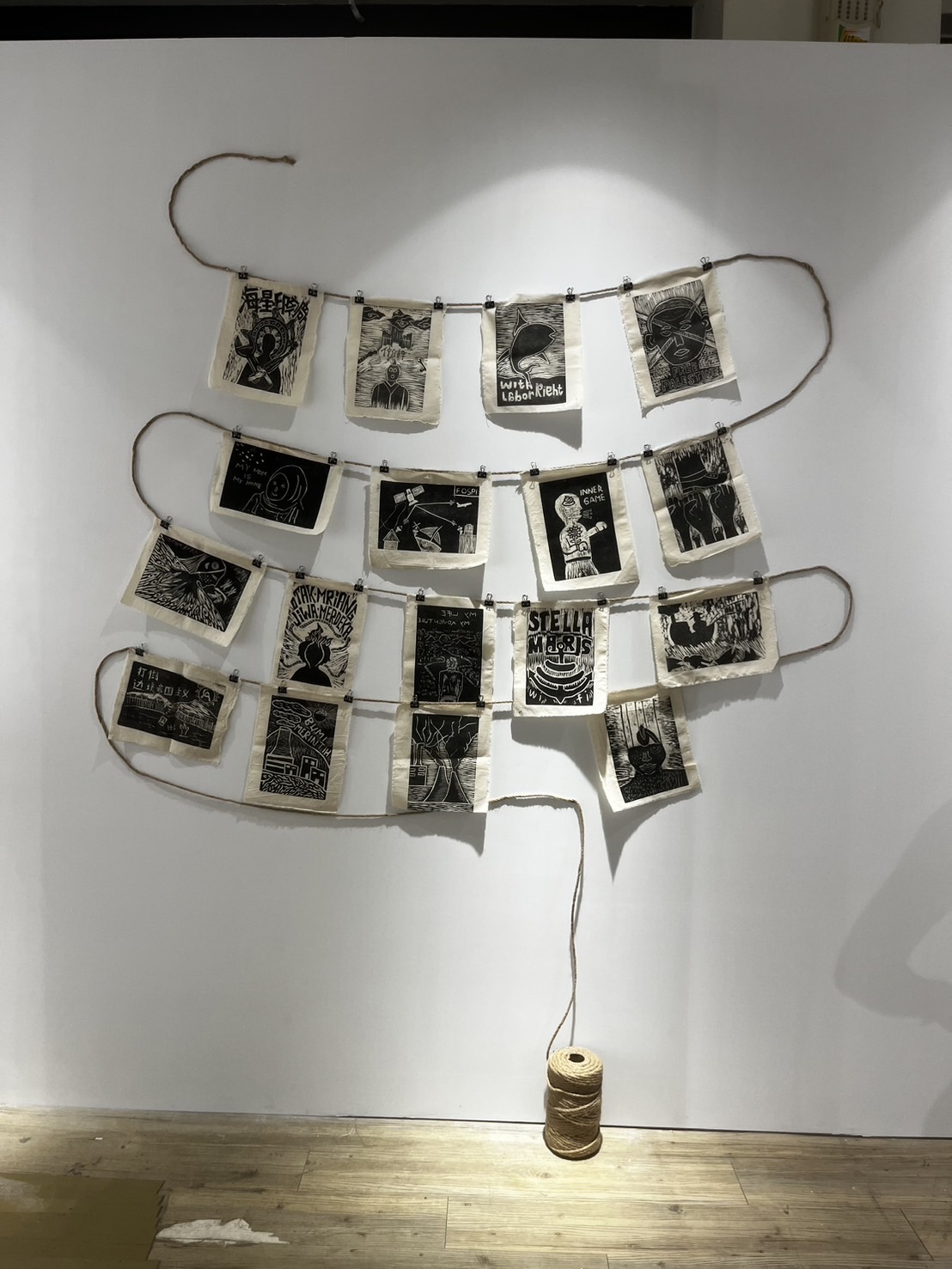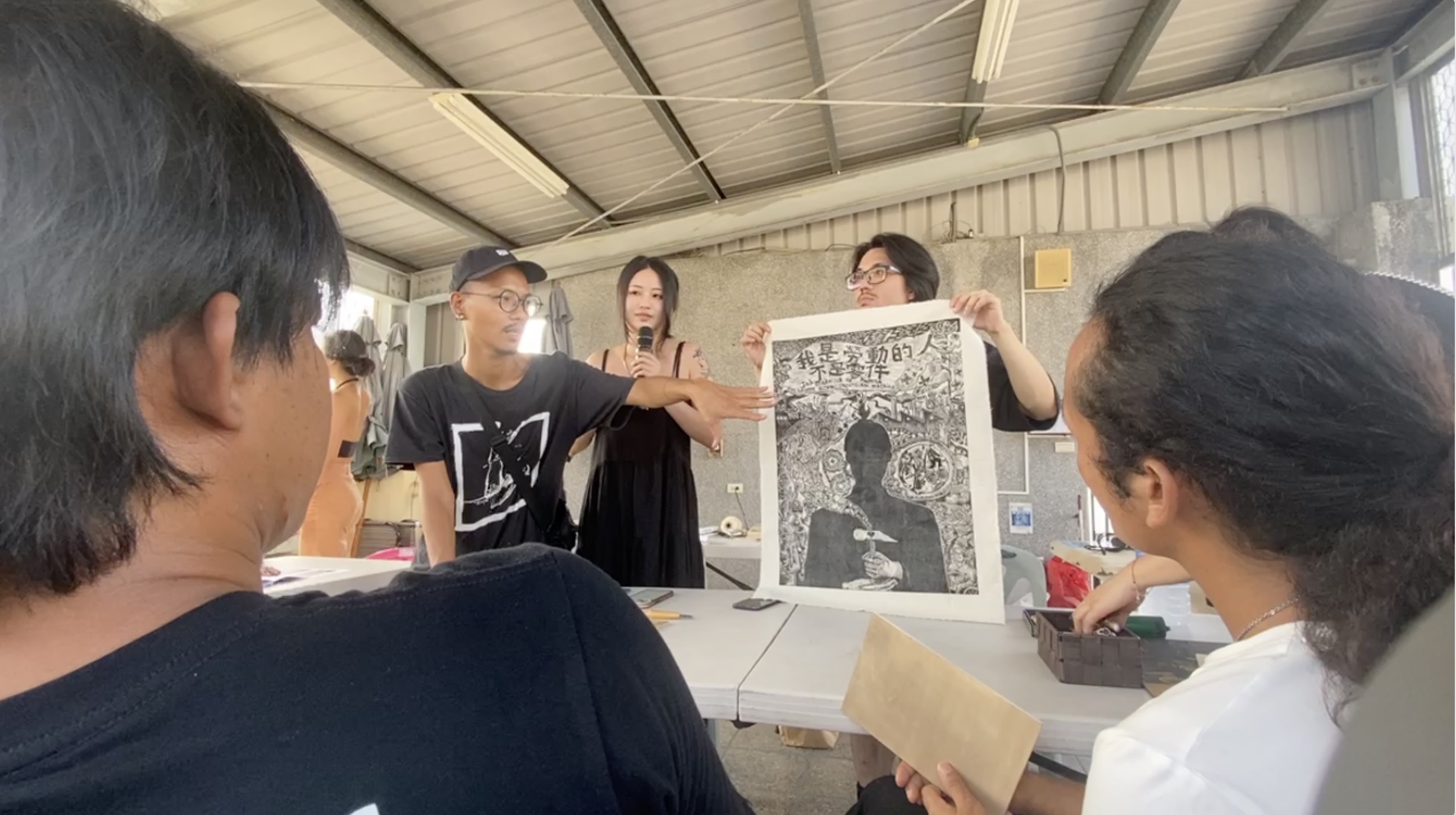The Transformation|Entangled Assembly






”The Transformation“ initiated my involvement in the Print & Carve Dept’s collaborative ’s collaborative project. Curator Gabriel Antonio, who research in history examines Taiwan’s Kaohsiung and the US-Mexico border’s export processing zones through a trans-Pacific lens. Both regions share histories of gender discrimination, economic dependency, and persistent pollution, inflicting ecological devastation upon border communities. The thesis examines the long-term history of the global factory’s rise, its political implications, and its role within the counter-revolutionary restructuring of capitalist production.
The exhibition was presented in 2024 at Azul Arena, an art space in Ciudad Juárez, Mexico. During the preparation and installation process, under the guidance of the curator, I had the opportunity to visit the U.S.–Mexico border together with other Taiwanese artists. We learned about the region’s natural geography, explored the efforts of local communities in Ciudad Juárez to protect and sustain their spaces, and visited industrial sites related to the historical development of Mexico’s border export processing zones and factory operations.
The exhibition was restaged at Kaohsiung Labour Museum in 2025. During this exhibition opening, members of the Print & Carve Dept. shared border experiences in exhibition talks. Collaborating with Kaohsiung’s migrant worker communities and local cultural researchers, they visited neighborhoods and venues frequented by immigrate worker in Kaohsiung, jointly creating woodcut works through collaborative workshops.
This exhibition workshop collaborates with Southeast Asian cultural worker Wu Ting-kuan and the Stella Maris Kaohsiung, inviting migrant workers in Taiwan to participate.




Participants’ Background
Some of the workshop participants are fishing boat workers whose employers provide extremely poor living conditions, with inhumane treatment often occurring in their living and dining environments. Fishing workers are unable to use WiFi during their 10-month-long offshore fishing trips, making it difficult to maintain contact with their families. In the event of accidents or emergencies, they are unable to protect themselves. Other workers employed in factories also express their concerns about environmental pollution caused by their workplaces through their creations.
The event venue, the ‘Stella Maris International Service Center,’ was established in 1968 originally to serve American troops during the Vietnam War. With the increasing number of foreign workers in Taiwan, the need for care and assistance grew. In 1996, the centre dedicated itself to serving foreign workers and vulnerable foreign individuals, striving to assist foreign workers and seafarers, and fulfilling its religious duty to protect and care for them, providing them with a safe haven.
Prior to the event, artist Wu Ting-kuan, who has long been concerned about migrant workers in Kaohsiung, led the Print and crave dept. in visiting Indonesian shops, restaurants, and gathering places near Kaohsiung Station. Making BBQ as dinner with migrant workers together, and getting to know one another. Some migrant workers share the problems they encounter while working in Taiwan, including labour conditions, labour rights, and physical and mental health.
Through workshops, the Printmaking Department shared its past initiatives and provided printmaking instruction, with the theme of expressing self-labor rights and the life experiences behind labor, collaborating with migrant workers on printmaking creations.
About the workshop
The event venue, the ‘Stella Maris International Service Center,’ was established in 1968 originally to serve American troops during the Vietnam War. With the increasing number of foreign workers in Taiwan, the need for care and assistance grew. In 1996, the centre dedicated itself to serving foreign workers and vulnerable foreign individuals, striving to assist foreign workers and seafarers, and fulfilling its religious duty to protect and care for them, providing them with a safe haven.
Prior to the event, artist Wu Ting-kuan, who has long been concerned about migrant workers in Kaohsiung, led the Print and crave dept. in visiting Indonesian shops, restaurants, and gathering places near Kaohsiung Station. Making BBQ as dinner with migrant workers together, and get to know each other. Some migrant workers share the problems they encounter while working in Taiwan, including work conditions, labour rights, and physical and mental healthy issue.
Through workshops, Print & Carve Dept. shared its past initiatives and provided printmaking instruction, with the theme of expressing self-labor rights and the life experiences behind labor, collaborating with migrant workers on printmaking creations.
Afterword
After the workshop, upon learning that the foreign workers involved would be attending a forum in the United States on foreign worker rights, the printmaking team created the print “I Want to Tell You, I’m Fine” (overseas fishermen can’t wait for Wi-Fi) in February 2025, hoping to support the basic human rights of foreign workers in Taiwan’s fishing industry.
In November 2025, to support migrant workers’ labor rights in Taiwan and abolish the 12-year work requirement for foreign workers in Taiwan, Print and crave Dept. collaborated with the Taiwan International Workers Association and its shelters’ foreign workers to continue developing the artwork SEE US! OUR LABOR, OUR RIGHTS, OUR DIGNITY!, and participated in the migrant worker march on December 8, 2025.
「變形記」計畫是筆者參與印刻部的創作計畫起點。本計劃由策展人加布里埃爾·安東尼奧(Gabriel Antonio)發起。他以跨太平洋視角研究歷史,並檢視了台灣高雄和美墨邊境的出口加工區。這兩個地區都曾遭受性別歧視、經濟依賴和持續污染的困擾,為邊境社區帶來了生態破壞。該計畫探討了全球工廠興起的長期歷史、其政治影響以及其在資本主義生產反革命重組中所扮演的角色。
展覽於2024年在墨西哥華雷斯城的 Azul Arena 藝術空間展出。在籌備布展的過程中,在策展人帶領下,我們有機會與其他台灣藝術家走訪了美墨邊境,了解該地區的自然地理,探索了華雷斯當地社區為保護當地空間所做的努力,並參訪了墨西哥邊境加工出口區的工業發展歷史與工廠現場。
該展覽持續發展研究並擴展合作計劃,於2025年在高雄勞工博物館展出。在此次展覽期間,印刻部的成員在展覽講座中分享了邊境實地觀察的經驗。在展覽一系列的活動中與與東南亞文化研究者吳廷寬和高雄移工庇護中心合作,走訪了高雄移工經常出入的街區和場所,並透過工作坊共同創作木刻作品。
參與者背景
部分工作坊參與者是漁船工人,他們的雇主提供的生活條件極其惡劣,經常在生活和工作環境遭受非人道待遇。漁民在長達10個月的海上捕魚作業期間無法使用 WiFi,難以與家人保持聯繫。一旦發生意外或緊急情況,他們也無法保護自己。其他工廠工人也透過創作表達了對工作場所造成環境污染的擔憂。
活動舉辦地「海星國際服務中心」成立於1968年,最初是為了在越戰期間服務美軍而設立的。隨著在台外籍勞工人數的增加,對他們的關懷和援助需求也日益增長。1996年,該中心致力於服務外籍勞工和弱勢外籍人士,努力幫助外籍勞工和海員,履行其保護和關懷他們的宗教職責,為他們提供安全的庇護所。
活動前,長期關注高雄外籍勞工的藝術家吳廷寬帶領印刻部走訪了高雄車站附近的印尼商店、餐廳和聚集地,與外籍勞工一起燒烤,增進彼此了解。一些外籍勞工分享了在台灣工作中遇到的問題,包括勞動條件、勞動權益以及身心健康等。
透過工作坊,印刻部分享了其過去的作品,並分享了版畫創作的技術,表達對跨國勞動權利的支持和政治理念,與跨國勞工合作進行版畫創作。
後記
工作坊結束後,得知合作之外籍勞工將前往美國參加一個關於外籍勞工權益的論壇,2025年2月創作了版畫作品《我想告訴你,我很好。》(海外漁民等不及Wi-Fi),希望以此聲援台灣漁業外籍勞工的基本人權。 2025年11月,印刻部為聲援移工在台勞動權利與廢除外籍勞工在台12年工作年限,與台灣國際勞工協會與其庇護所之外籍勞工合作,以「勞動被看見,權益即尊嚴!」持續發展創作,並參與2025年12月8號的移工大遊行。